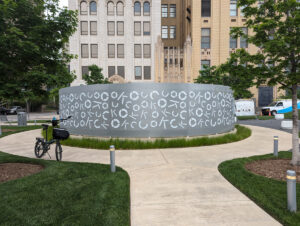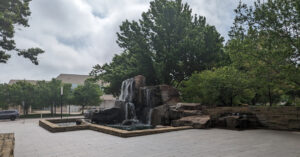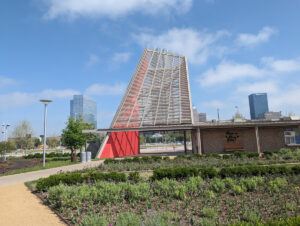If this study is not already challenging enough, it gets even more difficult the farther up the path you go.
The question becomes, “What shall we do when…?” Again, I cannot decide what is right for you. I have a mandate from God to share certain things He has put in my heart, but how people respond is His problem, not mine. When His hand moves in ways that leave me standing alone in the Covenant, that calls for one kind of lifestyle. When my faith sees a small covenant family grow, that’s another. As the covenant community grows, it then calls for yet another context with a different lifestyle.
How we interact with the world around us will also vary widely with the situation. When we have a strong hand, we do one set of things. When we have a weak hand, we do another set; the methods of the mission change. Solomon understood this well when he said there was a time for everything, “to everything a season.”
The issue here is not specific planning, but knowing where the moral boundaries are. We seek to study where the boundaries should be, not what plans to make. Nobody in their right mind would seek to organize concrete active responses via the Internet. What follows is strictly theoretical, a frame of reference for you to check against your own personal convictions. I’m trying to explain what I see in the Covenant.
We do not set out to conquer the world. Even if God dealt us a strong hand, we would refuse to rule outside of our own community. By the same token, we should not hesitate to respond with force to certain kinds of threats on the small scale. If I knew the Christian family down the road was at risk of having their children taken by force, I would certainly pray and consider ways to defend them. At the same time, I would have already warned people that the current atmosphere shares much with the Roman oppression Paul referred to when advising people not to get married. Jesus Himself suggested that having children during times of tribulation was a very heavy liability (Matthew 24:19).
What kind of threats do we see against the Covenant?
In broad general terms, secularism is so self-destructive that we need not do too much except stay out of the way. The threat profile is not that difficult to face. No, I would not hesitate to kill some commies, but it depends on their intentions and the leverage they possess at the time. The question is both strategic and tactical.
Islam is a wholly other story. Muslim behavior is uniform in one thing: When they feel strong, they will begin to conquer without fail. Once they get to that point, there is no going back until their numbers are reduced significantly and they are scattered. Islam appeals to something in human nature that no other “ism” does, and it will be a thorn in our sides until Christ returns.
On a broader community level, warfare of one kind or another is the best answer in almost every case, but the threat doesn’t justify attacking them in their own lands until they do reach out to conquer. Keep an eye on how they choose to engage in conquest, and answer that wisely. Meanwhile, they never immigrate; that’s just a term to cover invasion. As others like to say, sink the Muslim refugee boats. There is no condition under which they are not a threat as Muslims. Slaughtering them is not a sin, but refusing to recognize non-Muslims in their population is.
The threat of Judaism to the Covenant is much more nuanced, since it’s really an ethnic identity instead of an “ism”. In broad general terms, historical attacks on the Jewish community were mostly justified. I might argue with why the attackers moved or when, and I might suggest they should have chosen a different approach, but the Jewish elite have knowingly provoked every attack on their own Jewish people. It’s an integral part of their fundamental reason for keeping their Jewish identity. They can be your friends only when they have renounced that identity.
Other ethnic groups are dangerous. You should never make friends with Kurds who maintain a strong ethnic identity. The same goes with a lot of other people rooted in the lands bordered by Russia, the Middle East, and Eastern Europe — the various “stans”. The issue is the ethnic identity. They all are wholly untrustworthy; they’ll act friendly only when you have more money than they do. Gypsies are part of this.
The same goes for Hindus; it’s more of an ethnic tribal identity than a religion. The same is true of Africans in general, as long as they cling to their African identity (regardless of what they call it). Tribal racism is what it is. They are pagans with no functional conscience.
East Asians are a different kind of problem. China in particular is a long term threat to the Covenant, but any action requires truly understanding their motivations. Some of what they do is actually sensible and beneficial to human life. Asian communism is not just any old communism; it’s a whole library of study and I will not try to summarize it here, but they are a problem for covenant people.
But you shouldn’t think I’d let white people off the hook. Today, the single greatest representation of whatever white northern Europeans once were is the American culture. Granted, it’s now polarized between left and right, but neither is conducive to covenant living. That’s because both extremes share the same basic identity. Regardless of how you slice it, the entire gamut of Western Civilization is inherently feminist. It has always been there; the fruit we see now ripening was determined by the seeds planted long ago.
Americans will lie, cheat and steal under the false cover of laws carefully constructed to make it legal, taking everything you have and telling you that you love it. They will seduce you with the most unconscionable debauchery; America could teach Sodom and Gomorrah a thing or two. Fortunately, this is a self-destructive thing, and it will end quite definitively soon. But so long as “America” lives, it is a threat to genuine covenant faith. Their materialism is the fundamental nature of their threat profile. Selective violence does work against them, but the best move is to stay out of the way.
I’ve often warned that you must not see war and conflict as inherently sinful. Rather, clashing is inherently human. It’s part of mortality itself and we are not forbidden from engaging such things. Until you can explain why Jesus cracked the whip in the Temple, you cannot comprehend what part violence plays in the Covenant of Christ. There is such a thing as righteous bloodshed, and it has nothing to do with supporting any human government. It may well coincide with state-sponsored acts of war, but it should be evaluated on a wholly different level.
Finally, I’ve said this before: The Bible does not see a problem with terrorism. It actually saves lives, if that matters to you. If you think it doesn’t work, then you don’t understand why foreign armies never stay in places like Afghanistan. Don’t be bound by your enemy’s rules. If something warrants taking action, then you do whatever it takes to remove the threat. The only question is analyzing what is required for the given threat. There is no biblical prohibition against terrorism in Scripture; that false idea comes from prissy scolding elites. They don’t want competition.
The Covenant of Christ is not an ethnic identity; it displaces such a thing. You must renounce all human identity to enter the Kingdom of Heaven. You cannot limit who might be your brothers and sisters in Christ. The only thing that binds us together is a commitment to God’s glory. This is the one thing we would defend with human means. The default is that we would choose martyrdom, but there are situations where a defense of some kind is appropriate for the Lord’s glory.
The default is to embrace martyrdom, but we must remain aware that there are contexts in which defending the family of faith is God’s will.
















